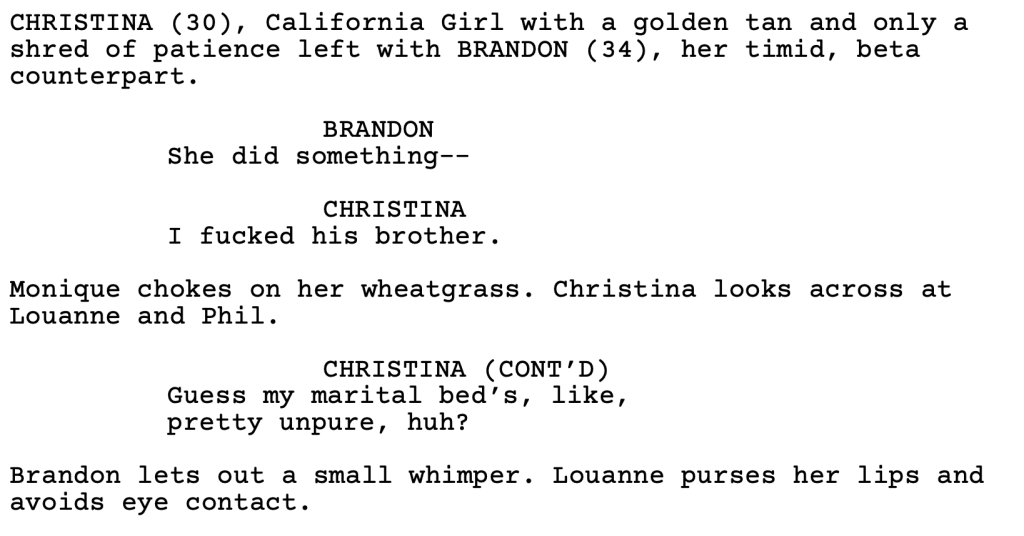Genre: Black Comedy/Thriller
Premise: When a freak storm hits a couples therapy retreat and turns all men in its path into predatory killers, a devoted wife and her new female allies must fight to save their lives, as well as their relationships.
Why You Should Read: MAELSTROM is a satirical contained thriller that takes the idea that the weather has the power to negatively affect our behaviour and amplifies it to 11. But what if we took it one step further still? What if it only affected male behaviour? And what if the affected men’s behaviour sorta, kinda, a teeny bit mirrored the behaviour displayed by asshole men the world over, resulting in a social commentary that explored themes of self-love and emotional independence in a battle royale of the sexes? Welcome… to MAELSTROM.
Writer: Stephen Thomas Parker
Details: 95 pages
It’s here!
After three months of non-stop writing and 300 entries, six of which were chosen for the High Concept Showdown, you guys voted Maelstrom the winner. I was happy to see Stephen Parker get the win because he’s been a LONGTIME reader of the site and the championship belt couldn’t have gone to a nicer guy.
However, you guys know how it is with me.
I don’t give free passes to anyone. If I’m going to give your script a ‘worth the read’ or higher, it’s got to be good. And thusly, the High Concept Showdown Winning Script Review begins!!!
After a fun opening scene where an old man turns into a psychopath who attacks his wheelchair-bound wife, we meet married couple Ash and Beth, who are escaping the city to experience a little R&R for the weekend. Well, that’s what Asshole Ash believes, anyway. In reality, Beth hasn’t told Ash that she’s taking him to… duh duh DUHHHHH – COUPLES THERAPY!
After they get to the therapy grounds and Ash yells at Beth for tricking him, we meet the rest of the couples. The retreat is led by 50-somethings Donna and Jean-Pierre. There’s Eleanor and Colin, who are so tied to the hip they complete each other’s sentences. We have masculine Christina and her beta husband, Brandon. We have Monique, who always puts her husband, Devon, in his place. As well as a few other couples.
Mere seconds after everyone introduces themselves, a storm rolls in, and with it, some sort of agent that turns men ——- CRAAAAAAAZY!!!! Instantly, the men begin trying to kill the women. Beth and every other woman who manages to survive charge into the mansion and slam the door behind them.
As the women try and grasp what’s happening, the men attempt to get inside, climbing up the side of the house to get in the windows. That’s when staff member and certified badass Chen arrives with a gun and starts shooting men dead!!! Unlike these women, who all have attachments to these rabid killers, Chen has no one. And that makes her a mean killing machine.
Believe it or not, it’s Beth who argues that Chen – and everyone else for that matter – needs to calm down and figure this out. If the men are under a spell, that means the spell can be broken and they’ll get their husbands back. But when the men go into full-on attack mode, Beth loses her sister soldiers, who confirm their belief that the only way out of this clusterfuck is to kill all men!
Normally, after I finish an Amateur Friday winning script, I don’t want to know what anybody thought because I don’t want those thoughts to influence my own review. But the second I finished Maelstrom, I went right over to the High Concept Showdown comments because I had to see what people thought of this script.
But, before we get to that, let’s talk about what worked here. My favorite part of this script, by far, was the first 20 pages. Stephen did an amazing job setting up the story and the characters.
After a fun teaser, he did a great job with the first scene, which has Beth and Ash driving to the marriage counseling retreat. Whenever I encounter a familiar scenario in a script, I’m looking for whether the writer is going to approach it the same way everyone else does or find a new angle.
A married couple going to counseling is a common scenario. I’ve read it in dozens, if not hundreds of, scripts before. Usually, the scene is written with a lot of tension in the air. You can feel that there’s something broken in the marriage. And while it’s an effective way to set broken couples up, it’s the same scene every time.
What Stephen did, instead, was clever. He made it so that Beth hadn’t told Ash they were going here. She’d tricked him into believing they were going on a weekend getaway. Then, Stephen informed the audience of that piece of information before Ash was looped in. All after setting Ash up as the world’s biggest asshole. What this did was create a dramatically ironic scenario by which we’re dreading the moment that Ash realizes they’re on a marriage counseling retreat. We know he’s going to go apeshit. Yet, we have to see what happens when he finds out so we keep reading.
Not only did Stephen give us a fresh angle with this setup, he created a situation that hooked the reader, forcing them to continue on to see what happened next. Brilliant.
The next big sequence is the introduction of all the couples at the retreat. I’ve been encountering this strange new trend whereby writers barely introduce characters. They’ll say something like, “Long brown hair and stocky.” Something that gives zero insight into the character. They’ll then follow that up by NOT giving the character an introductory action. Introductory actions are what allow us to remember characters. If you introduce someone yelling meanly at someone else, we’re going to remember them as a meanie. If, however, you introduce someone and don’t have them do or say anything, they are instantly forgettable. And yet so many writers do this.
Here’s how Parker introduces one of the couples.
You’ll notice that, even though the character descriptions are short, they’re informative. We instantly get a feel for this couple. That’s followed with actions from both characters that reinforce those descriptions and, as a result, cement the characters in our head. Stephen did a great job with all the characters in that regard.
And then our movie takes a sharp turn. The storm moves in and all the men become psychopaths. The shift is so severe that it literally feels like someone picked us up out of one theater and dropped us down into an adjacent one. It’s pure crazed violence to the extreme. And I’m not sure I ever recovered from that.
The beginning of the script felt so thoughtful. I could feel the writer meticulously setting everything up. Then it’s, “AHHHHHHHH!!” “BANG BANG!” “STRANGULATION!” “KNIFE TO CHEST!” Over and over and over again. When action gets repetitive – no matter how intense or fun or exciting that action is – returns begin to diminish. And returns were diminishing quickly. Within ten pages of being inside the mansion, I was already exhausted.
But I hadn’t give up on the script yet. That would happen on page 33. This is when we learn that there’s a man in the house somewhere. Now, on the surface, this is a good idea. There’s a man on the loose somewhere, hiding in the house. Not only does that create tension and suspense, but it changes things up a little. We finally get a break from the crazed violence. And yet, something about it didn’t work for me and I couldn’t figure out what it was.
It was only once I read Brenkilco’s comment that it became clear. He pointed out that Stephen had established that this disease turned everyone into manic crazed psychos. Why, then, has one of them turned into a careful plotting stalker? Out of nowhere, the rules had changed. And in a movie like this where you’re asking the audience to buy into a pretty out-there concept, it’s imperative that the rules behind that concept be consistent. Once you break a rule, it now feels like the writer is making things up as they go along.
Which is the whole reason that I liked the beginning of the script. It was so well planned out. You could tell that Stephen had a reason behind every choice he made. That seemed to disappear once the storm hit. And, unfortunately, the script never recovered after that.
I’m not quite sure what advice I’d give to Stephen on this script. The central problem – the outrageous repetitive action – is a big enough issue that a lot of this script would need to be rewritten. And, unfortunately, I don’t know what I’d put in its place. Maybe you guys have some ideas. I’d be curious to hear them.
Oh, and one last thing. I want to give Stephen props for this line, which made me laugh out loud: “And suddenly, this fight looks very different… because Beth’s on the attack and hell hath no fury like a woman whose husband googled his wedding vows!”
Script link: Maelstrom
[ ] What the hell did I just read?
[x] wasn’t for me
[ ] worth the read
[ ] impressive
[ ] genius
What I learned: You get one moment in your script where everyone’s running around like chickens with their heads cut off. Otherwise, you need structure to your set-pieces. What does ‘structure’ look like in a set piece? Check out the final backyard party in Parasite. Check out the trash compactor scene or the trench run in Star Wars. The talk show in Joker. The dueling ferry boats in The Dark Knight. The Pamela Anderson book signing kidnapping in Borat. You need a clear directive. Physical boundaries. A set of rules the audience understands so they can participate. And, finally, a little imagination to make the scene fun. Randomness is okay once. But if it’s the primary formula for your movie’s action, the movie’s going to feel messy.



